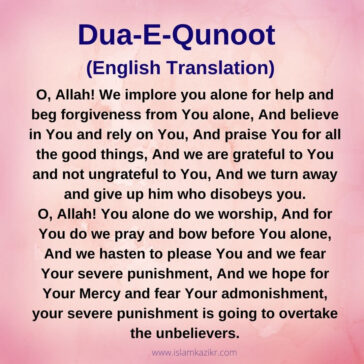

I seek Your forgiveness and I repent unto You. All I praise is upon You for what You decide. And none whom You have taken as an enemy shall taste glory. Surely, You hold the command and are not commanded, and none whom You have committed to Your care shall be humiliated. Protect me from the evil You have ordained. Take me to Your care with those whom You have taken to Your care. O Allah, guide me with those whom You have guided and grant me wellbeing with those whom You have granted wellbeing. Wa sallallāhu ‘alā sayyidinā Muhammadin Nabiyyil ummīyi wa ‘alā ālihi wa sahbihi ajma’īn The ruling for both of these two types of Dua Qunut is Sunnah.ĭua Qunut is recited on the last unit of prayer (raka’at), after the I’tidal, while still standing, and before proceeding to the Sujud position. It is recommended to raise both hands upon reciting the Dua Qunut. This can be a way of showing solidarity as Muslims towards others. It can also be recited when we are intending to provide assistance for others or a place that are facing adversity or disaster. When a crisis or calamity happens, it becomes a Sunnah to recite Dua Qunut Nazilah. Qunut Nazilah is recited during the obligatory prayers including the Friday prayers. Dua Qunut Nazilah, which is specifically recited in times of calamity or seeking Allah’s protection. Dua Qunut Rotibah (regular) that is recited during Subuh prayer as well as the Witr prayer on the second half of Ramadan. It is also sunnah for those who did not perform or may have missed the Dua Qunut Rotibah in prayer to do the Sujud Sahwi before giving the salam.Ģ. encountered a calamity during the early stages of prophethood in Makkah.ġ. The Dua Qunut was first practised when our Prophet Muhammad s.a.w. which is read at a specific Rukun in Solat (while in the form of i’tidal - standing). The Arabic word ‘قنوت - Qunoot’ has multiple linguistic meanings, one of which simply means ‘To Stand’.Īs a Fiqh term, it means A supplication or praise to Allah s.w.t. The supplication of Dua Qunut is the supplication recited during Subuh prayer (Fajr prayer). So let them respond to Me (by obedience) and believe in Me that they may be (rightly) guided

I respond to the invocation of the supplicant when he calls upon Me. It is indeed our utmost duty to seek from Him goodness and forgiveness in times of hardship and ease. We supplicate to express our gratitude and thankfulness to Allah s.w.t. Dua Qunut in English with transliteration and translationĪmong the signs of a humble servant is when he constantly consults The One who created him.


 0 kommentar(er)
0 kommentar(er)
